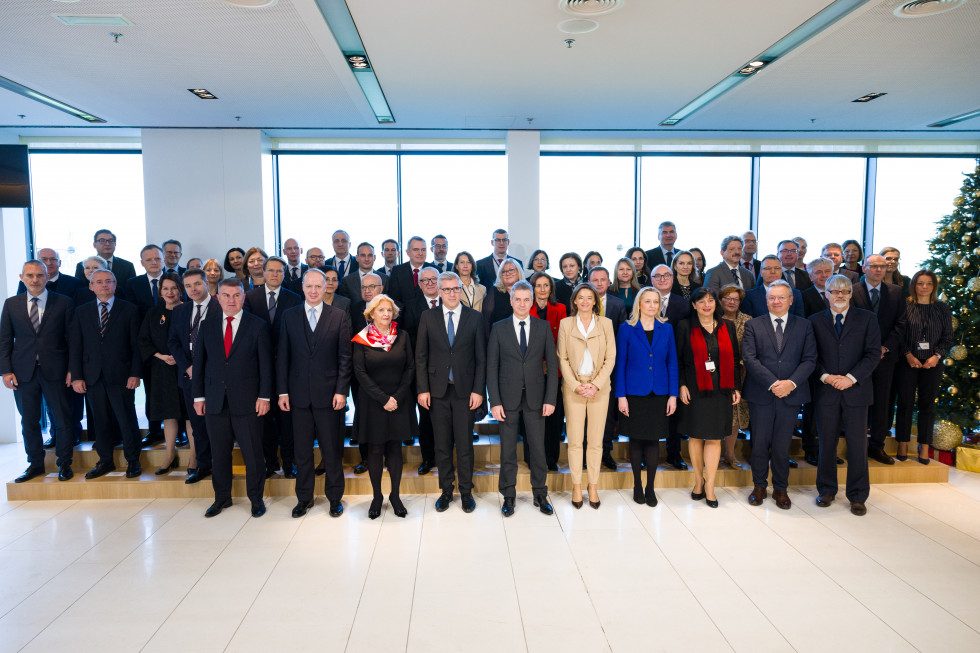Slovenian diplomats to remain professional, active and highly motivated

Slovenian Diplomatic and Consular Corps and Prime Minister Robert Golob at the 27th Consultation of Slovenian Diplomats | Author Ministrstvo za zunanje in evropske zadeve
Opening speeches were delivered by Tanja Fajon, Minister of Foreign and European Affairs, Nataša Pirc Musar, President of the Republic of Slovenia, and Urška Klakočar Zupančič, President of the National Assembly. All three stressed the important role of both male and female diplomats and the importance of unity in the positions taken by Slovenia in its foreign policy. “The rule of international law is increasingly being replaced by the rule of power. This has been most brutally demonstrated by the Russian aggression against Ukraine, where we are witnessing the devaluation and trampling underfoot of the basic postulates of modern society. It is also happening today with the humanitarian catastrophe in Palestine. It is horrifying to know that every ten minutes a child dies in Palestine. There is no excuse for terrorism, ever. There is no excuse for the humanitarian catastrophe that is unfolding before our eyes in Gaza, where the majority of the victims are women and children. As I have said many times before, and I say it again today, the world has failed the test of humanity in Gaza, and this test cannot be retaken, I fear. No such privilege will be granted," said Tanja Fajon, Minister of Foreign and European Affairs, in her opening address.
The President of the Republic of Slovenia, Nataša Pirc Musar, called on diplomats to take a broader view of the Russian aggression against Ukraine and to consider what role the European Union can play in supporting Ukraine in the future. She also recalled the crimes being committed in Gaza. "I often say that foreign policy must be coherent. And I believe that in the EU it is. I am glad that we are no longer involved in what is known as “going it alone”. In this difficult world, it is all the more important to have a coherent foreign policy," said President Pirc Musar. She expressed confidence that Slovenia would do an excellent job in the UN Security Council and praised Slovenia’s achievements in 2023: "We have to be aware of why we are successful. It is because we have a good reputation abroad. It is because we are principled and not beholden to vested interests. I am proud to be President of such a country and it will be a great pleasure to continue representing it abroad”.
The President of the National Assembly, Urška Klakočar Zupančič, highlighted the coherence of Slovenia’s diplomatic service and the expansion of its activities through cultural, scientific and economic diplomacy: "The identity of the nation, its values, its strengths and the state of its social and political awareness are reflected in culture and artistic creation. Cultural diplomacy is one of the most important instruments of foreign policy. It is not only a language of subtle communication, of identifying related peoples and understanding less related cultures, but also a means of preventing conflict. This type of diplomacy is often neglected, but it provides some unique opportunities for development. I would like to encourage you to use culture as a means of raising awareness of Slovenia, its people and the quality of Slovenian artists. It is often overlooked that art can also be closely linked to business”.
On the second day of the Consultation, the diplomats held a discussion with the Prime Minister of the Republic of Slovenia, Robert Golob, who opened it with the following message: “In 2023, you've worked hard to make Slovenia stand out in the world, and I want to thank you for that. You have made it easier for all of us. In 2023, Slovenia achieved one of its greatest diplomatic successes”. He added that 2024 will be a challenging year, as Slovenia will hold the presidency of the UN Security Council in September, when many events will take place: "I am sure that you will make me and the citizens of Slovenia proud”.
The diplomats also discussed the situation in Ukraine and the Middle East. They agreed that Slovenia should continue its support for Ukraine. With regard to the Middle East, they underlined their commitment to Slovenia's continued active role, particularly in the light of its forthcoming membership of the UN Security Council. They stressed the importance of continued work towards achieving a lasting peace that would allow Israelis and Palestinians to live side by side in peace. They also discussed the organisational, technical and human resources orientations of the Ministry and the network of diplomatic missions and consular posts.
The third day, 19 December, will focus on Slovenia's membership of the UN Security Council, both in terms of content and organisation of the preparations for this important task. European issues will also be discussed, with particular emphasis on EU enlargement to the Western Balkans.
